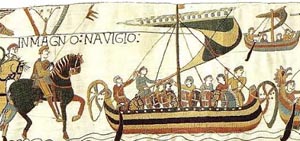 The first known Vautorte was Joel, born about 1000. Before dying in 1054,
he fathered Hugh, Ralph, Roger, Goesfried, Joel II, and Reginald (born in
1032 near Torteval in Normandy). The Vautortes held lands in northern French
provinces of Normandy and Mayenne including the towns of Torteval and Vautorte.
When William, Duke of Normandy invaded England in 1066; Reginald, Hugh,
Goesfried, Ralph and Roger accompanied him and were at the Battle of Hastings.
The first known Vautorte was Joel, born about 1000. Before dying in 1054,
he fathered Hugh, Ralph, Roger, Goesfried, Joel II, and Reginald (born in
1032 near Torteval in Normandy). The Vautortes held lands in northern French
provinces of Normandy and Mayenne including the towns of Torteval and Vautorte.
When William, Duke of Normandy invaded England in 1066; Reginald, Hugh,
Goesfried, Ralph and Roger accompanied him and were at the Battle of Hastings.
William, now King of England, granted Reginald land in Devon and Cornwall and the barony of Harberton. Reginald built Trematon Castle in the village of Saltash in Cornwall upon the ruins of an earlier Roman fort.
For over nine centuries Trematon Castle has overlooked Plymouth harbor.
The walls of the keep are 27
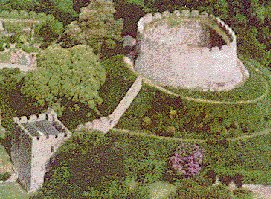 feet high and 15 feet thick at the base. The internal diameter is about
70 feet. The rectangular gatehouse, built in 1270, has two stories and
a portcullis. Both are still in good condition today, one could live in
gatehouse. When Sir Francis Drake returned from his round the world voyage
in 1580, the treasures he "collected" from Spanish treasure galleons were
stored in Trematon Castle. More on Trematon Castle at
Saltash and Tamar Valley
History and at Wikipedia.
feet high and 15 feet thick at the base. The internal diameter is about
70 feet. The rectangular gatehouse, built in 1270, has two stories and
a portcullis. Both are still in good condition today, one could live in
gatehouse. When Sir Francis Drake returned from his round the world voyage
in 1580, the treasures he "collected" from Spanish treasure galleons were
stored in Trematon Castle. More on Trematon Castle at
Saltash and Tamar Valley
History and at Wikipedia.
The last Vautorte owner of Trematon was Roger de Vautorte, who sold the castle to Richard, Earl of Cornwall in 1270. After Roger died in 1275, the land and titles were split up, and the family ceased to play an important role in Devon and Cornwall. There were, however, no shortage of Vautortes in the area; as younger siblings had struck out to become squires, knights and farmers in their own right.
From 1066, civil and Church records spelled the name various ways: Vautorte, Valletort, Valtorta, Vautordus, Vautord and eventually Vauter and Vawter. By the 15th century, there were Vawters spread all over Devonshire.
Grace Vawter Bicknell's book, The Vawter Family in America credits a John Vawter (born in 1665 near Plymouth England) as the "father" of American Vawters, coming here in 1685. But almost everyone now disputes this, and many even question his existence.
Larry Wilcox's book, De Valletort Norman Knights, places a John Vawter in America in 1656. Martin Baker of New Kent County, Virginia paid for the transportation of 35 individuals from Plymouth, England. John Vawter was one of these 35. Captain John Opie II, brought these indentured servants on his ship, the "Richard and James" to work on the Baker Plantation near present day Richmond, Virginia. Voyage took 35 days.
Bartholomew VawterProbably born between 1660 and 1670, possibly near Plymouth, England, but could well be a son of the John Vawter of Baker's Plantation. By 1687, we know he is in Virginia and settled in Old Rappahannock County. He, too, may have been indentured to a Mr. Thomas Opie and may have had a brother named John.
In any event, we know Bartholomew married Winifred Hodgson in 1690. Winifred was the daughter of William and Onah or Orah Hodgson. By the time of his death in 1717, he owned a large plantation. Bartholomew and Winifred had six children: Edward, Richard, Benjamin, John, Augustine, Margaret, all born in Essex County, VA.
John VawterBorn in Virginia in 1691, died in 1752. He married Margaret Noel (daughter of Daniel Noel and Elizabeth Page), and they had seven children: Bartholomew, Angus, Richard, Beverly (male), Margaret, Winifred, and David. John owned a lot of land in Essex County, before moving to Madison County, Virginia where he and Margaret died.
John was in some way responsible for the building of Vauter's Church, in St. Anne's parish, Essex County, Virginia. Whether he provided the land, the building materials or merely owned the land next to its location, he is the Vawter most closely associated with the church. More on Vauter's Church at Essex County Virginia and Wikipedia.
David VawterBorn about 1725-33, he may have died about 1779, married Mary Offill (daughter of Mary Rucker and granddaughter of Peter Rucker). They had six children: Jesse (b. 1755), Philemon, William, Winifred, Margaret, Mary and, perhaps, another son named David.
David is described as a merchant in Orange County, Virginia. In June 1775, he enlisted in the army and served in the 1st Virginia Foot Militia under Captain Ambrose Madison and Colonel Francis Taylor and took part in the Battle of Great Bridge. At one point, he was responsible for guarding loyalist and British prisoners of war. More on the Battle of Great Bridge: Great Bridge Battlefield and Wikipedia.
Jesse VawterBorn in 1755, died in 1838. He married Elizabeth Watts (daughter of John and Sarah Watts). During the Revolutionary War, Jesse served in Capt John Camp's Company, First Virginia Regulars under Col. George Gibson. He was a merchant in Culpeper County, Virginia, who later moved to Georgetown, Woodford County, Kentucky and finally to Indiana where he helped to found the town of Madison. Jesse and Elizabeth had nine children: John, William, James (b. 1783), Frances, Mary, Sarah, Julia, Achilles, and Ann. More on Jesse from Georgene Jurgensen at the Vawter Family website: Vawter Family website. Link to photograph of Jesse's grave.
From Grace Vawter Bicknell's The Vawter Family in America:
JESSE VAWTER
Jesse Vawter was born in Culpeper county, Virginia, December 1, 1755. His parents were Episcopalians and he was sprinkled in infancy and his name enrolled on the church record. He was married to Elizabeth Watts, the daughter of John and Sallie (Barnett) Watts, on March 29, 1781. Elizabeth Watts was born December 30, 1762. Nine children were born to them: John, William, James, Frances, Mary, Sarah, Julia, Achilles and Ann.
Jesse Vawter was, in his early manhood, apprenticed by his father to a mechanic; was a soldier in the Revolutionary War for a short period; was baptized in a Baptist Church (Rapidan) in Culpeper county, Virginia, October, 1774.
About the year 1782 Jesse Vawter, with his wife and infant son John, moved from Virginia to the Holston river country, which is near where the three states, Virginia, North Carolina and Tennessee, now join. Their twin sons, William and James, were born there. In 1785 Jesse, with his wife and four children, returned to Virginia for a visit. They left William, one of the twins, there with his maternal grandparents. In 1787 Jesse visited Kentucky and decided to move there. He and his wife, with the infant Sarah, went for a farewell visit to Virginia in 1789, and in 1790 the family removed to Kentucky. On the way they passed the Crab Orchard country, old Milford Court House, stopping over night with Joseph Delaney, where Richmond, Kentucky, now is, crossing the Kentucky river, passing through Lexington, Kentucky, and arriving at Achilles Stapp's September 22, 1790. Jesse Vawter leased a farm from Hugh Shannon for five years from the fall of 1790. In 1795 he moved to Scott county, Kentucky, and settled on his own farm on the north side of the North Elkhorn river, three or four miles from the forks of the two Elkhorns and seven miles from Frankfort. In 1796 Franklin county was formed, and his house was then in Franklin county. (A fuller account of this part of Jesse Vawter's life will be found in the "Reminiscences" of his son John.)
In 1806 Jesse Vawter lost his land through a defective title. That same year he moved to Indiana and located on a hill overlooking Madison, on what is now known as the Michigan Hill Road. He called his home and farm Mount Glad, because he was glad there to rest from his wanderings and hoped to spend his days in peace. Madison was a very small settlement at that time. The Vawter family is inseparably connected with its early history and with the history of the Baptist denomination in Indiana. Jesse Vawter began to preach in about the year 1800. He was ordained in 1805. In 1807 he assisted in the organization of the First Baptist Church in Jefferson county, which, at that time, was called the Coffee Creek Baptist Church. This church was organized at Mount Glad. At its constitution there were but fifteen members, and these were all of them connected with the four families who had come together from Kentucky in the fall of the year before. These four families were the Vawters, the Underwoods, the Edwards and the Jacksons. In 1808 these members built a meeting house of logs on the hill east of the Michigan road near the present site of Fairmount Cemetery. When Jesse Vawter learned of a new settlement being formed, he visited it and held religious meetings. As the country developed his preaching tours were enlarged, covering great portions of the counties of Jefferson, Ripley, Switzerland, Jennings and Clark. In some cases these settlements were reached by traveling from twenty to forty miles through the wilderness, much of the way being marked only by blazed trees and broken down underbrush. In 1812 the Coffee Creek Church built a new frame meeting house on the North Madison hill, now west of the railroad, and with that change of location, also changed its name, afterwards being called the Mount Pleasant Baptist Church. This church was again moved and became the First Baptist Church of Madison. From its first formation until 1831 Jesse Vawter was almost its only pastor, Jacob Cox and William Vawter and Reuben Morey serving some of the time during the later years. In the minutes of the Madison Association for 1838, we read: "Jesse Vawter was preeminently useful in the ministry and did much to advance the Messiah's kingdom here on earth, especially among the Baptist churches from their first organization in Indiana, but more particularly in the bounds of what was and is known as the Silver Creek, Coffee Creek, Loughery, Flat Rock and Madison Associations. He was without doubt one of the most pious men of his day, and, as a doctrinal, practical and experimental preacher, his qualifications and ability for evangelical preaching was far above mediocrity, and as a peace-maker he was, perhaps, without his equal in the congregations of which he was a member."
Elizabeth, wife of Jesse, died September 10, 1830. Afterwards Jesse lived with his daughter, Polly Branham, for a while, and with another daughter, Ann Moncrief, for a part of the time. He died, March 20, 1838, in his eighty-third year.
Jesse Vawter was a quiet, thrifty, brown-eyed, peace-loving man. His granddaughter, Mrs Frances (Vawter) King, of North Vernon, Indiana, in speaking of him said: "Grandfather was of a gentle nature. Every one loved him. He used to ride down horseback from Madison to see us. We would run to meet him, and he would say, ' There come my chickens.' He had lost the sight of one eye in an accident. We used to slip up on his blind side and kiss him, and he would always jump as though we had surprised him greatly. He never was impatient with us."
Mrs Nancy (Moncrief) Amsden, of Madison, Indiana, another granddaughter, said: "I can remember grandfather well and I love his very name. He lived at my father's for some time before he died." Elizabeth, wife of Jesse, was a woman of strong character, and her grandchildren stood somewhat in awe of her. She was an excellent housekeeper. Her great cleanliness was a matter for joking among her neighbors. They said that she never could endure flies - that she chased them out of her house and down to the Ohio river. In speaking of her fondness for scrubbing, they declared that they believed she scrubbed even the stumps in her yard.
Jesse Vawter's story, as told by himself
I, Jesse Vawter, being in my eightieth year, do this day begin to write a journal of my life. I was born December , the first day, 1755, in Culpeper county, Virginia. I was sent to school in my eighth year. About this time my father moved into Orange county, and I worked on a farm for about ten years. I was the oldest child of six, and had by nature a mechanical turn of mind. I did some coopering, and made me a lathe and did some turning; I also made some wheels with a millwright. In 1774 my father hired me to a house carpenter and joiner. In 1775 my father set me at liberty to act for myself. At this time there was a great call for flax wheels. I joined my Uncle Oppill. We prepared our timber, built us a shop with two rooms, chimney in one and stove in the other. Each of us had a lathe made and mended wheels until November, 1777, when I drove a team and moved a family out to Holston, three hundred miles, where I attended a farm with two negro men for Joseph Early.
In December, 1778, I went back to Virginia, and followed house carpenter's and joiner's work until November, 1779, when I drove a team for Uncle I. Coper, when I had three uncles and a brother all in a company moving to Holston. We unloaded our wagons the second day of December, 1779. I had bought of Joseph Early four hundred acres of land, on which my brother Philemon and Jonathan Underwood settled at that time. In the next year, 1780, I labored on a saw and grist mill for old Mr Keywood. In December I went back to Virginia, and in 1781 was married, March twenty-ninth day, and in June was drafted for two months' tour. I got back to my wife's father's late in August and was three months sick. My wife has told me that they sat up with me forty nights and thought every one might be the last. The next winter and spring I made myself a light wagon and had it ironed nicely. In January, 1782, our son John was born .
In the latter part of April I geared three horses and loaded my property and set out for Holston, three hundred miles, and unloaded the 17th of May on my own premises, and raised a tolerable crop of corn that year.
In the fall of 1783, I went to old Virginia with my wagon and moved Aunt Underwood to Holston. In 1785 I, with my wife and children, went again to Virginia on a visit ,and was gone from the 13th day of September to the 24 of November. I had built me a shop, and followed making and mending wagons, and other work, as also attending to my farm until 1790. In December, 1787, I went to Kentucky on a visit to see my friends, and in 1790 I sold my land and moved to Kentucky, and landed there in September, 1790. In 1789 my wife and myself, with Sally our baby, went on horseback to old Virginia on a visit to bid our friends a final farewell, as we expected to move to Kentucky the next year. We unloaded our horses at Brother Stapp's , September 22d. I took a lease on Mr. Shannon's land for five years, put up a log cabin and moved into it in November, 1790. August 13, 1791 I left home and went to Holston to aid my Brother Philemon to move to Kentucky, and got home again September 20.
August 7, 1793, I left my home and went to Virginia to aid father Watts in moving to Kentucky, and got home again the 18th day of November, 1793. In 1795 I moved to the north fork of Elkhorn, three miles above the forks, and we lived there until September 6, 1806, when we moved over the Ohio to Indiana. During our residence in Kentucky I made looms, made and mended wagons, made and mended wheels, reels, and did other mechanical work, but never neglected my farm. And also, while I kept house in Indiana, I had a shop and did do almost all kinds of mechanical work, yet never neglected my farm. I have observed on a minute-book that I had earned in my shop $344, and that I had received for marriages $151. In 1830 we broke up housekeeping, and on September tenth my wife died, and I have made my home with Polly Branham, but am a great deal of my time absent. Since the death of my wife, I have not confined myself to labor, but have done some little jobs, and have received about forty dollars for marriages. Julia Wise died May 10, 1834. September, 1835, I attended at Loughery Association, and came home sick, and am yet quite feeble this first of December.
A LATER STATEMENT BY JESSE VAWTER
At the request of one of my friends I now sit down to record some of the occurrences of my past life. I, Jesse Vawter, was born December 1, 1755. My parents were David and Mary Vawter, members of the Episcopalian Church. I was sprinkled in infancy and received as a member of that church, and could read my Bible in my eighth year, and was brought up to farming, but had by nature a mechanical turn of mind. At ten years of age I had serious thoughts of religion and heard a parson preach from these words: "Who among us shall dwell with devouring fire, who among us shall dwell with everlasting burnings?" Isaiah xxxiii:14. That subject made a deep impression on my mind, although I understood nothing more than a local fire. About this time I committed the Lord's Prayer, which I would repeat when I would lie down at night and in the morning, in order to get religion, but finally concluded that I would live moral and sober until I married and then I would get religion, concluding that religion did not suit young people and when I was settled in the world it would be easy to obtain it.
As stated above, my mind inclined to mechanical labor. In 1774, in my nineteenth year, my father consented to hire me to a house carpenter and joiner. In the course of that year our work led us twenty miles from my father's, and in the bounds of Baptist preaching. Perhaps in the month of May I went to the first meeting. The preacher was Thomas Ammons; his text was Job x:15: "If I be wicked woe unto me, but if I be righteous yet will I not lift up my head." These words came home to my heart with such light and power that they made me tremble.
I had never felt the like before. I strove to be composed and not let any person know I was affected, but all in vain, the tears would run. I did not think I was as wicked as some, but thought I was not altogether right - that there was some little wrong about me, and now I thought the Lord had called on me to repent and seek Him, which I was determined to do. I thought by praying, reading and reforming that I should soon atone for past sins and bring God under obligations to me (alas ! poor blind man). Instead of that, I discovered the corruption of my nature and the deceit of my heart, and that all my efforts had been selfish and, of course, sinful, and that God says, "Son, give me thy heart," which I had not done. I now did believe that God had called me, and if I had sought Him through Jesus Christ, I might have obtained mercy; but now it appeared to me as if all hope was gone forever. I yet would try to pray, but thought my prayers only added to my guilt. I concluded God was angry with me, that his law condemned me, and it was in vain to ask His mercy, for I thought my case was finally fixed forever. Yet my heart would pray for mercy if it could be bestowed according to the divine government, for I did believe God was right and His law was right, and if I was condemned forever it would be right, too. I concluded justice would not suffer me to live on the earth when right appeared. I thought I should be in eternity before morning, and in the morning that justice would terminate my life before night.
One clear morning in July, 1774, I thought I would retire and try to pray once more before I died. When I got to the place I thought I dare not ask for mercy, yet my heart seemed to crave mercy, but I could not see how God could have mercy on me consistent with His divine perfection. Finally I concluded my fate was fixed to go down to ruin forever, and I rose up to go to my work. As I arose a reconciliation took place in my mind - the will of the Lord be done. With this reconciliation I had a view of Jesus and His righteousness. I thought all nature shone with His glory. I could now see how God could have mercy upon poor sinners and be just and justify him that believed in Jesus. I did believe He had lived and died for sinners and rose again for their justification, and that I was one of those poor sinners that He came to seek and save. My soul was filled with love. I thought I could tell to my companions how good God was, and they would feel as I did, but they understood not what I told them. In the month of October our work led us into the bounds of another Baptist church, to which I offered myself and was received and baptized. The first Saturday meeting I ever attended I thought was the prettiest sight I ever saw. The church was called Rapidan, in Culpeper county, Virginia, but now Madison county.
I thought I would work as much as would keep myself in clothes and spend my time in going to meeting and be with the preachers; which I did for some years. I would sing and pray and close meetings for the preachers. In 1780 I began to think it was best for young persons to marry, and on the 29th day of March 1781, I was married to Elizabeth, daughter of John and Sarah Watts, of Culpeper county, Virginia. In January, 1782, the 8th day, our first son, John, was born, and in May we moved to Holston, where we lived eight years, andd had two sons and three daughters born, and joined a Baptist church, whose monthly meetings were twenty miles off. The preacher would come to my house and have meeting in our neighborhood. Having lost all hope of a Baptist church near us, we moved to Kentucky in 1790, where we joined the Great Crossing Church in Scott county, and lived there five years. While there I appeared to be a silent member. In 1795 we moved down on the north fork of the Elkhorn and moved our membership to Melonal's Run, where I was more active.
In 1799 a revival of religion broke out on the Ohio, and in 1800 it appeared to spread over the whole state. A number of my neighbors and four of my children had obtained hope in Jesus, which led us to form ourselves into a church and build us a house. About this time my mind got exercised about preaching, which soon led to my ordination.
Here we lived five or six years in great harmony, until I lost my place. In 1806 we moved to Indiana.
It may be proper here for me to state the difference in my mind as respects preaching. I thought that preachers were a grade higher than common members and that it would be wicked in me to think of preaching, but to sing, and to pray, and to exhort was the privilege of every member, and also to tell how good the Lord was, which I did do for many years, with delight to myself and some others. When my mind took a turn for preaching it was the greatest trial I had ever met with, for I thought no man ought to preach but such as the Lord called to that work, and I could not believe that I was called to preach, and to run before I was sent would be wicked, and to refuse to do what the Lord enjoined on me would be wicked. It appeared like death to go forward and death to be silent.
About this time I heard two brethren preach; the first was from the words of Jeptha : "I have opened my mouth to the Lord and I can not go back." The other was: "Woe to him that striveth with his Maker." I had opened my mouth to the Lord and was unwilling to go back; and I thought I would rather die to strive against the Lord. Finally, I concluded to submit my case to my brethren, for they all appeared to encourage me to go forward; and to this day I am made to wonder how it is that my brethren do invite me onward. But I do believe the best evidence that a man can have that it is his duty to preach is the voice of his brethren, for no man is a proper judge of himself; he will judge too high or too low of his own performances.
I have this day entered my eightieth year. I have been a citizen of four states, was born in Virginia, lived there twenty-five years; then moved into the edge of North Carolina, and lived there ten years; and then moved into Kentucky and lived there sixteen years, and in 1806 moved into Indiana. I have been a member of eight churches, and have in general sat under the same doctrine that I first believed, which was the total depravity of human nature; the divine character and sonship of Jesus Christ; salvation alone by free and sovereign grace, effectual calling, justification by the righteousness of Jesus Christ imputed, and the final perseverance of the saints; and that the atonement made by Jesus Christ is general in its nature, but special in its application, and that the change that takes place in the sinner is by the spirit of God illuminating the eyes of the understanding so as to discover the purity of God's laws and the nature of sin, and the way of life and salvation by Jesus Christ, and where this faith is found it will produce a corresponding conversation and deportment. I believe also in the overruling grace of God and the freedom of the will, and that God will judge the world by that man who He hath ordained, and that there will be a resurrection of all in that day.
I have been at the constitution of twelve churches, and have aided at the ordination of eight ministers; have baptized persons in eighteen churches; the highest number at any one time was 18, and the greatest number in any one church was 127. I have been at the formation of three associations, and have served as moderator twenty-three years in succession; and have solemnized perhaps little short of two hundred marriages. In the year 1834 I attended three associations. In the year 1835 I attended three associations and have baptized three persons this year. In 1836 I was at Coffee Creek Association, but was very feeble. In 1837 I was at Madison Association, and was very feeble. Jesse Vawter died March 20, 1838, eighty-three years old.
JESSE VAWTER'S WILL
In the name of God, Amen. I, Jesse Vawter, of Jefferson county and state of Indiana, do make and ordain this my
last will and testament.
Item: My will and desire is that whatever may remain of mine at my death shall be equally divided among my
children, to wit: John, William, James, Fanny, Polly, Sally, Julia, Achilles and Ann.
Item: I appoint and ordain my two sons, John and William to be the executors of this my last will and testament.
Written with my own hand this 13th day of April, 1832.
Acknowledged in presence of Thos. T. Stribling, M. M. Burns, and Elias Stapp.
Codicil to what I have already written.
1. My will is there shall be no court to prove my will.
2. That M. Wise shall receive the same as if his wife were still living
3. My will is that those indebted to me shall not be pressed for money under one year, and that without interest.
4. My wish is that my executors shall make ample satisfaction to those of my friends who shall wait on me in my
last hour.
Written under an impression that I shall die soon, this 27th day of December, 1837.
Jesse Vawter Thomas T. Stribling M. M. Burns Elias Stapp Codicil attested before assigned"
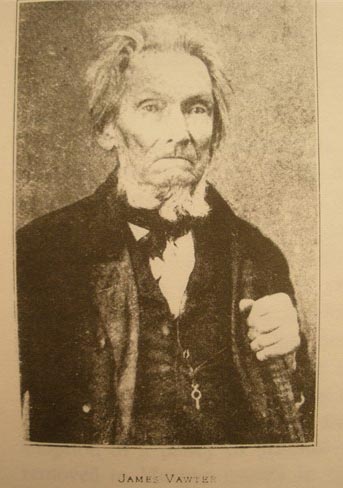 James Vawter
James Vawter
Born April 2, 1783 near the Holston River in what is now eastern Tennessee (but at the time it was North Carolina). He married Sarah (Sally) Watts (1796-1879) in 1816. Sarah was the daughter of Judge John Watts and Sarah Sebree.
With his father, Jesse Vawter, he moved from the Holston River area first to Kentucky and then in the Spring of 1806 to Indiana, settling in Madison, Indiana. There, at the top of the hill on Michigan road, he built his home, which he named "Mount Glad".
James and Sarah had 11 children: John Watts Vawter, Jesse Holman Vawter, Frances Vawter, Johnson Vawter, Willaim C. Vawter, Milton S. Vawter, James S. Vawter, Newton W. Vawter, Fanny S. Vawter, Susan E. Vawter and Thomas S. Vawter.
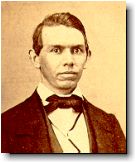 James S. Vawter
James S. Vawter
May 9, 1831 to Aug. 5, 1881
Grace Vawter Bicknell says "James S. Vawter, son of James and Sarah (Watts) Vawter, born May 9, 1831; married, by Elder John Stott, June 19, 1856, to Mary Cowell, who died in 1857, leaving no children. James S. Vawter married, second, Pheba Almeida Rollins [actually Rawlings] in January, 1864, and had two children. James S. Vawter lived most of his life in Jefferson and Johnson counties, Indiana. He was engaged in the grocery business for many years, and was postmaster for several years. He was an ordained Baptist minister, but did not preach regularly. He was always a great worker in the church and Sunday-school, of which, at the time of his death, he had been superintendent for twelve years. He wrote a great deal for the papers. He died August 5, 1881. Pheba Almeida Vawter died July 13, 1887."
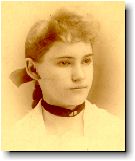 Effie Almeda Vawter Kerr
Effie Almeda Vawter Kerr
Aug. 10, 1872 to Feb. 26, 1921
Born in North Madison, IN, died in Billings, MT. Married George Scott Kerr on September 5, 1893. George and Effie had three children, Stanley Ingomar Lycurgus Kerr, Arleigh Robert Kerr (my father), and Reese Vawter Kerr.
Vawter Genealogy Details
Go to Vawter Family website
Go to Vawter GenForum website
Go to RootsWeb Vawter Board website

